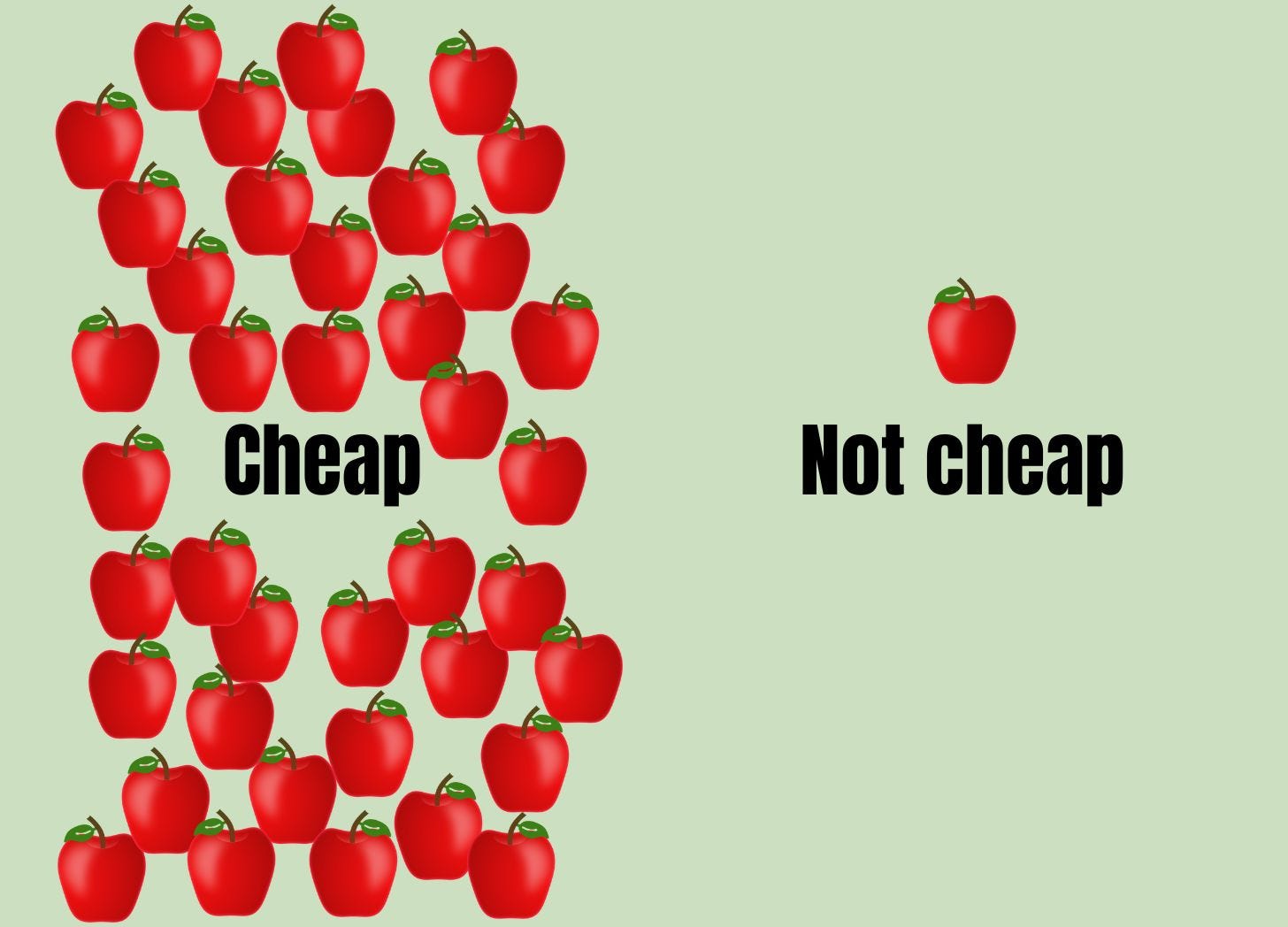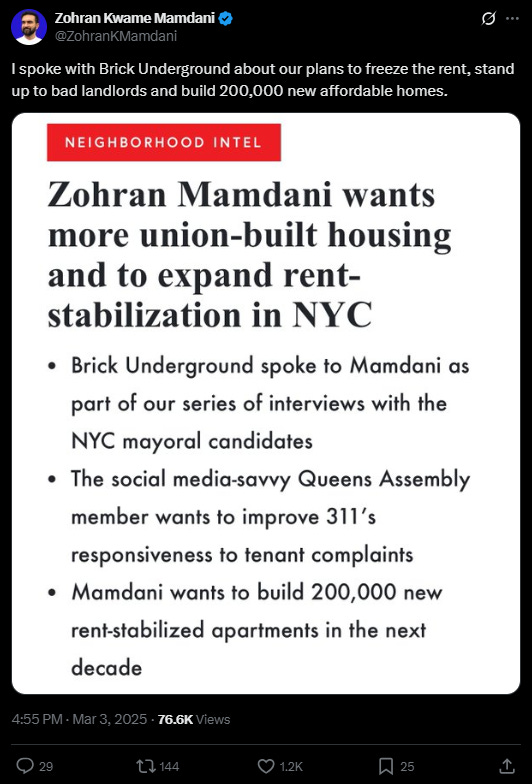Sound economics will open the doors to abundant housing
Beware the feel-good political rhetoric promising homes for everyone.
Good urbanism should transcend politics. In the same way that political opponents can enjoy the same type of food, films, or flowers, they can enjoy having practical and interesting destinations within walking distance of home. Socialists and capitalists can walk the same neighborhood and agree it’s a pleasant place to live. They can both appreciate the tree canopy, the corner café with people spilling out onto the sidewalk, the mixture of ages seen walking or riding bikes, and architectural details of the older buildings.
Whether they get there by bus, bike, car, or on foot, people across the political spectrum want the same thing: places that work for everyday life. Places that feel safe, accessible, and appealing for young and old.
You can find shared interests among unlikely alliances when you step out of political tribes. People who label themselves as conservatives, liberals, capitalists, and socialists are all standing at town hall podiums to speak up about zoning, housing, transportation, the cost of living, and so on. Many are calling for changes that, just a decade ago, would have been dismissed as fringe. Hooray for unity, right? High fives!
I want to tell myself that we're living in a time where ideology can take a back seat to pragmatic solutions, but there's one inescapable topic that will keep the disparate political groups fighting over how to get good urbanism. There's plenty of consensus about the ends (e.g. safe transportation systems and abundant housing) but the means will be hotly debated.
Economics is the reason for the divide. Not that one philosophical team has more money than the other, but the fundamentally different views on economic systems. Or, let’s face it, the outright ignorance about how an economy thrives or dies. There’s no reason for all of us to be experts in every subject, or even to have confidence in the basics. But when you’re interested in urbanism, it sure helps to understand the role of economics.
It’s encouraging to see on-paper enemies form a bond over the YIMBY (Yes In My Backyard) movement. Still, be prepared for the massive ideological fight now that young socialists are growing in prominence in cities across the country. If a YIMBY’s preferred economic system involves artificially controlling prices, centralizing control over land use, decoupling production from profit, and dismissing private property, then that YIMBY is actively making homes more scarce.
I’m singling out this one particular group because a socialist economic system delivers scarcity, not abundance. Before I describe why, I’ll offer a warning. An awful lot of people are far more interested in being accepted by their group(s) than they are in being right or wrong. Intelligent humans will assign a cartoonish good guy vs. bad guy label depending on affiliation. So when I write something critical of socialism, some will have the urge to react with “socialists want to destroy the world” while others pop off with “you must think it’s fine for people to be stuck outdoors without a home.”
My default position is that most people are most interested in their personal wellbeing, followed by the wellbeing of their family and friends. I also think most people would be happy if most people were happy. (Please spare me the outlier cases of explicitly hostile tribal behavior that has always and will always exist on this planet.)
So whatever you already think about socialism, I’m going to try to keep your attention focused on the economic reasons that I think socialism will never deliver abundant housing.
Without outside interference, a price is a signal that tells builders, buyers, investors, and neighbors where scarcity exists and what people are willing to trade for something they value. If everyone in a town has an apple tree, the price of apples is low. If only one person has an apple tree, the price of apples is high.
When the price of small and medium-sized homes goes up, it means there aren’t enough small and medium-sized homes to meet demand. If the price of single-unit, detached homes is going down, it means there are plenty of those types of homes to meet demand. Prices aren’t good or bad, they’re just indicators of a market. As Friedrich Hayek put it, prices are “a system of telecommunications.”
Capping rents or mortgages, freezing prices, or mandating below-market outcomes turns off the feedback loop that helps developers know where there’s opportunity to build more homes. Rent control sounds compassionate, but it discourages new construction, incentivizes disinvestment by the property owner, and traps tenants in place, all while potential new renters are locked out of the area. You can’t balance the supply of a product with the demand for that product without market feedback. You can’t build your way out of a crisis if pricing mechanisms are disabled.
State ownership without price signals breed inefficiency, because there’s no feedback loop to punish bad decisions or reward timely ones. Without profit motive and pricing discipline, resources drift, costs balloon, and production slows.
“My platform is that every single person should have housing, and I think faced with these two options, the system has hundreds of thousands of people unhoused, right? For what? If there was any system that could guarantee each person housing, whether you call it the abolition of private property or you call it, you know, just a statewide housing guarantee, it is preferable to what is going on right now.”
—Zohran Mamdani, democratic socialist, frontrunner to be Mayor of New York City
“People often ask what socialists mean when we say we want to 'decommodify' housing. Basically, we want to move away from a situation where most people access housing by purchasing it on the market & toward a situation where the state guarantees high-quality housing to all.”
—Zohran Mamdani
Omar Fateh is the democratic socialist frontrunner to be Mayor of Minneapolis, and he’s echoed some of the same economic ideas as Mamdani. I’m not a mind-reader, so taking him at his word, Fateh wants everyone to have a dignified life. To their credit, both Mamdani and Fateh recognize the failures of the status quo. They want the supply of homes to meet the demand for homes. But if the brute-force economic plan comes with a rent freeze, a ban on landlord profits, or a demand that new housing be owned and operated by the state, they’re going to end up replicating the scarcity they’re trying to avoid.
Socialism won’t deliver abundance
In the Soviet Union, state ownership of housing led to chronic shortages, causing millions of people to wait years for places to live, resulting in overcrowded communal living and black markets for basic dwellings. In Cuba, government control left housing stock decaying, with families crammed into crumbling buildings amid perpetual repair backlogs. Even in more moderate examples like Sweden's post-war rent controls, people were stuck on long waiting lists (sometimes decades) because suppressed prices discouraged new construction and maintenance.
When pricing is allowed to function, developers have to think carefully about what kinds of homes people will actually want. Investors have to weigh risks and decide whether a particular market is worth entering and/or expanding. Builders have to decide whether it’s worth constructing a new duplex or renovating an old triplex.
It doesn’t matter how pro-housing a land use policy sounds if the economics plan ignores basic supply and demand principles. You can’t central plan your way into abundance. You can’t price freeze your way into affordability. You can’t subsidize your way past scarcity without creating even more scarcity down the line. Socialist housing schemes often treat the problem as one of allocation, not production. But you can’t allocate what hasn’t been built, and you can’t build at scale without market-driven signals showing what to build, where, and for whom.
For a variety of reasons, there will be more self-proclaimed socialists running for elected offices. The convergence of urbanists across the political spectrum is encouraging because good urbanism doesn’t belong to one movement or ideology. But if human flourishing is the goal, we can’t afford to ignore sound economics.
Let the market work. Fight to loosen local land use rules that put strict limits on the location and type of homes that can be built so that more homes can be built.






Isn't it a little convenient to separate economics from everything else, and only look through this one very minimal lens at how societies work? Especially, in an economic system that is geared toward (white) home ownership for the upper classes ( it's curious that Section 8 has a limit, but tax deductions for home ownership are unlimited).
It's a little like saying that healthcare is better when there's a free market. But when the state has a role in health care and a role in unemployment and in housing, all of a sudden the incentives is not just to make as much money as possible, the patient is no longer just a cash bag, a let's get them well enough to leave, but make sure they come back for more. All of a sudden, there's a greater responsibility for creating conditions for a healthy life, not just narrow economic prosperity for the few.
And it's similar with housing, minimum wages, having easy access to a healthy living (a food and drug administration that care more about the general population's health, than the pockets of food producers), afforable riliable public transport, easy options to bike (not just in rich communities), healthy grocery options, non-economically segregated schools, these are all aspects of housing. But economist always wants us to believe that it's this simple sum game of supply and demand, not admitting how the demand is so often rigged, underwritten by all these other factors. And then, when the economists are once again wrong about their models, there's no responsibility, no consequences. It's all just market market market...I guess they didn't get the memo in Vienna.
Comparing communism and modern socialism is kind of silly especially considering European socialism Which Arguably urbanism is a part of.
The government already competes in the market for instance the USPS competes with UPS Fedex and DHL.
The goals of corporations and the goals of the government Are significantly different
If there's a project any type project that would benefit society I don't see a reason why local state or federal government shouldn't be able to do it even if it competes with corporations
Europe with less GDP Better quality of life
Corporations take advantage of the government For their own Advantage even at the Detriment of society
One of the reasons why zoning laws are as bad as they are is because they benefit the automotive industry but also large developers who are the only ones who are able to get through the hurdles put in place which prevents smaller developers and individuals from competing effectively
Ideally it could be both the private sector and the government providing more housing especially since the calculations for the two are significantly different
It's very valuable for individuals to be able to make bets on their own houses Whether it's a business in the front or apartments it should be legal for individuals to make these bets which are currently not legal to do because of the zoning laws
Both the economy and towns / cities Are incredibly complex
We can't let companies be without restriction but also we can't have the government do ever thing
The Soviet Union did actually do a good job at providing housing
https://youtu.be/1eIxUuuJX7Y?si=